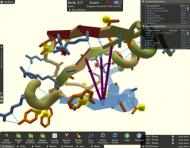 Game playing of all types has become a huge passtime for many and nearly an obsession for some. Now science is harnessing the power of gaming to solve complex problems.
Game playing of all types has become a huge passtime for many and nearly an obsession for some. Now science is harnessing the power of gaming to solve complex problems.
More than 57,000 people, many of them nonscientists, got involved in Foldit, a game designed to solve the puzzle of protein structure. A report in the Aug. 5 Nature discussed the success of the project.
Foldit, the game created by Seth Cooper and his colleagues at Washington State University, tackles the protein-folding problem, one that has long vexed science. Proteins are the building blocks of much of life and are its movers and shakers — they make reactions go, send signals between cells and partake in a suite of other tasks.
Each protein starts as a string of amino acids and must fold into its particular 3-D structure before it can do work. Scientists know that a protein’s final shape is determined by the sequence of its amino acid building blocks. But predicting that final structure from the amino acid sequence alone is extremely difficult.
Foldit recruited the online community to tackle the problem. Players tweak, tug and twist partially folded proteins, with the aim of reaching 3-D structures that are energetically comfortable for the protein to maintain.
“I’m a self-confessed hopeless addict; in seven months I’ve missed only two days. But every day, and in every way, I’m getting better,” said one Foldit player in an informal survey conducted by the researchers.
Researchers discovered that the human brain pool is superior to computers in solving complex problems. The project suggests that online games tapping into the wisdom of crowds may be a fruitful approach to scientific challenges. “It’s a new kind of collective intelligence, as opposed to individual intelligence, that we want to study,” according to Zoran Popovi?, a computer scientist and engineer. “We’re opening eyes in terms of how people think about human intelligence and group intelligence, and what the possibilities are when you get huge numbers of people together to solve a very hard problem.”
Foldit was such a success that the University of Washington is starting a new center for game science, Cooper says. Perhaps many scientific problems — especially spatial ones — can be tackled en masse online.
“The mere acts of giving people points for doing something and pitting people against each other are huge motivators,” says NickYee, who studies the sociology of online games. “Dress a tedious task in the guise of a game, and there are players who will spend hours and hours on end doing a task they wouldn’t otherwise do.”



